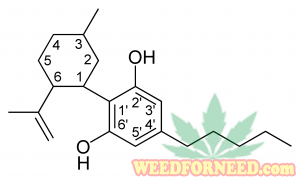New study explores cannabis effect on short term memory
The effect of weed on your short term memory has long been a standard in any cannabis-comedy routine. Now, researchers are unlocking the effect of cannabis on memory.
 A new study published in the British Journal of Psychiatry suggests that variations in the chemical makeup of different strains of marijuana are associated with different levels of cognitive impairment while high.
A new study published in the British Journal of Psychiatry suggests that variations in the chemical makeup of different strains of marijuana are associated with different levels of cognitive impairment while high.
Tetrahydocannabinol (THC) is commonly recognized as the ingredient in marijuana that causes a “high” in users, but researchers have long known that pot contains other active substances as well. While THC can cause the widely advertised hallucinations and paranoia, another chemical found in marijuana, cannabidiol (CBD), is believed to be responsible for the calmer, sedating part of the experience. The two chemicals have opposing effects on one of the brain receptors affected by cannabis, the CB1 receptor.
Some clinical studies have proposed that CBD acts as a balancing force to regulate the strength of the psychoactive agent THC.
Marijuana with relatively high ratios of CBD:THC is less likely to induce anxiety than marijuana with low CBD:THC ratios. CBD is also believed to regulate the body’s metabolism of THC by inactivating cytochrome P450, an important class of enzymes that metabolize drugs.
To determine the effect of different levels of CBD, researchers studied 134 cannabis-using volunteers while they smoked their own stash of marijuana, at home. They gave them various cognitive tests, either while stoned or abstinent. Then, they took samples of the pot back to the lab for testing.
The amount of cannabidiol contained in the marijuana varied widely — from 0.14% or less to 0.75%. Researchers found that individuals that smoked the weed with the lowest CBD had significant impairments in their ability to recall words, while those whose pot had higher levels of the chemical had no impairment at all. (The study authors controlled for any variance in levels of THC.)
Interestingly, however, unlike previous studies, the new research did not find that CBD reduced the hallucinatory and paranoia-inducing effects of THC that can be associated with psychotic episodes.
While some growers have bred “skunk” marijuana, which has extremely high levels of THC, less intense varietals with increased CBD can also be found. If this research holds up, the mellower high may be the smarter choice.

For those that grow their own cannabis for personal needs, I’ve heard that CBD level are higher for buds which are given longer to ‘ripen’ in the flowering stage. Many people chop down their plants after they’ve been flowering for only 8 or 9 weeks. However, for the buds to fully develop, they often need 10-14 weeks in the flowering stage. When the cannabis plant is given the full three monthes in the flowering stage, you can see under a microscope that more of the trichomes/crystals have turned amber as opposed to being clear or milky white. Buds grown this way supposedly more CBD, and from my own personal experience, fully ripened buds often have less of the paranoia and other side effect associated with high amounts of THC without CBD. Buds which are given the full time to ripen also seem to be better for treating anxiety, which is the main reason I grow cannabis (I have a recommendation).